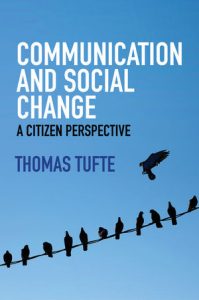Chris Kamlongera, the People’s Professor

Chris Kamlongera, one of the great African ComDev scholars, best known for research on theatre for development in Malawi, passed away last week. “He was a strong inspiration to several generations, a committed scholar with an immense energy who will be deeply missed,” says Thomas Tufte.
Ørecomm publishes excerpts of the obituary written by Linje Manyozo Mlauzi, a Senior Lecturer in Communication for Development in the School of Media and Communication, Royal Melbourne Institute of Technology, Australia. He once became a student of Chris Kamlongera when joining the arts programme at the Chancellor College, where Chris Kamlongera introduced drama as a tool for ComDev. Dr. Manyozo Mlauzi shares his memories.
Instead of sitting in class and teaching us theories and concepts as is expected of orthodox and banking education, Chris herded our whole class into Thom Allan Village, by foot. He divided us into small teams and requested us to engage with villagers. We would go from house to house, talking to residents about local development issues. Chris discouraged any note taking, instead, emphasized that we join the villagers in whatever activity they were undertaking.
“You have to listen,” was his mantra at the beginning of each field exercise. Upon returning to classrooms, we would analyze the issues and then come up with plays. On an agreed date with the village leadership, we would perform these plays, which would bring in local participation. If he were concerned with the direction of a particular scene, he would join the performances as a drunken character to ensure we delivered the right messages. A fabulous actor!
This was my entry into the world of communication for development. For Chris, the practice was always more about the democracy of the communicative process and its transformative attributes, and media technology are just tools, if required, to facilitate that engagement. This is the theoretical essence that Chris instilled in us at the Village University of Thom Allan – whilst seated at the village arena, singing and performing with local people.
For us students we did not know that we were part of a larger intellectual scheme of things. That we were contributing to the radical deconstruction of the dominant syntax in communication and development.
There is a fascinating experience I encountered often when I studied, and later on, collaborated with him. Everywhere I travelled with him, villagers would call him out loudly from their gardens, “kodi aphunzitsi muli bwanji?” (How are you teacher?). In and outside class, he was the people’s professor.
Communication for Development & Drama
The explosion of communication for development practices can partly and largely be traced to the wonderful efforts of the original Chancellor College Travelling Theatre of the 1970s. Under the leadership of Chris Kamlongera, David Kerr and Mupa Shumba, the Travelling Theatre employed local language dramas in mobilizing communities to take up social services.
In taking time off from teaching to undertake development practice, Chris showed that a progressive scholar should leave the classroom, and allow for the empirical testing of their ideals, something I have tried to emulate. Alongside these professional experiences, Chris also consulted for and advised governments and development organisations.
I had the rare honour and privilege of knowing him as a teacher, as a friend and as a colleague. Chris personified communication for development. Alongside Nora Quebral in the Philippines, Juan Diaz Bordenave and Alfonso Gumucio in Latin America, Chris pioneered a radical communication practice that allowed experts and local people to contest power in the formulation and implementation of development policies.
As a person, Chris dearly loved his wife Cecilia, his children and family. I am sure they know that Chris was more than a teacher; he was a people’s professor and a great man. He always built and uplifted everyone. As Professor Thomas Tufte of Leicester University responded on hearing the tragic news – “Such a wonderful person, kind, humble, smart, productive and engaged with fundamental challenges of the world.”
As we join his biological and extended families in mourning his departure, please let us also join the academic fraternity in immortalizing and celebrating his life, his love for humanity and his enormous intellectual legacy.
A great lesson that Chris taught us is well captured by the Spanish poet, Antonio Machado, who observes, Caminante, no hay camino, se hace camino al andar (Traveller, there is no road, you make the road by walking).
Chris challenges all of us today to actively intervene in creating a society that is equal and democratic by walking this symbolic road. Chris himself traveled many roads but this dusty road to Thom Allan Village is significant as it opened up intellectual and professional avenues for many of us. Over and above his many publications, Chris respected and celebrated the wisdom and knowledge of local people, among whom he rests now in the beautiful valleys of Lilongwe.
We will walk that symbolic dusty, windy and unforgiving road in honour of the people’s professor. And where there is no road, we will create one.
 New PhD opportunities at the University of Leicester
New PhD opportunities at the University of Leicester Call for Abstracts: New Directions in Media, Communication and Sociology (NDiMS) Conference
Call for Abstracts: New Directions in Media, Communication and Sociology (NDiMS) Conference Ørecomm Team to Gather at the University of Coimbra
Ørecomm Team to Gather at the University of Coimbra “Communication and Social Change – A Citizen Perspective” Published
“Communication and Social Change – A Citizen Perspective” Published C4D Network to Sum Up Global Communication for Development Practice
C4D Network to Sum Up Global Communication for Development Practice Entering Media and Communication into Development Conferences?
Entering Media and Communication into Development Conferences? IAMCR Conference 2016: Communication for Development Highlights
IAMCR Conference 2016: Communication for Development Highlights Glocal Classroom Revisited – Storytelling & Social Change Leicester-Malmö
Glocal Classroom Revisited – Storytelling & Social Change Leicester-Malmö I EvalComDev International Conference: Call for Papers
I EvalComDev International Conference: Call for Papers Looking for Media and Communication in Development Conferences: Devres 2016
Looking for Media and Communication in Development Conferences: Devres 2016